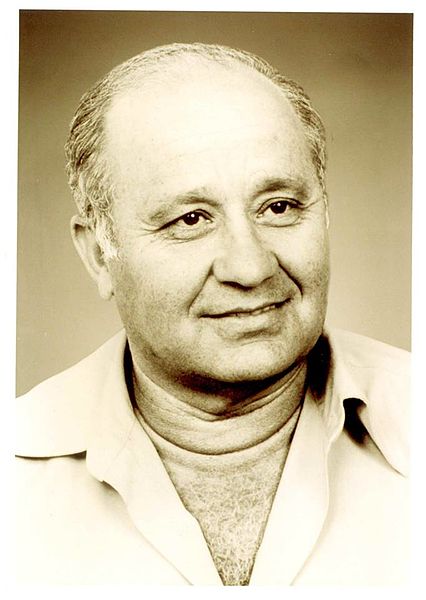Yitzhak Hofi
(1927 - 2014)
 |
Yitzhak Hofi (Haka) was the fifth Director of the Mossad, and served from 1974–1982. He was born in 1927 in pre-State Israel. Hofi enlisted in the Palmach in 1944. In the IDF, he served in the paratrooper unit, and participated in the Reprisal Operations (Peulot HaTagmul) and in the Sinai Campaign. He was a commander in officer school, a paratroopers brigade commander, and head of the operations department in the Operations Division, under Division Head Ezer Weizman. He later commanded the training department.
During the Yom Kippur War, he was General of the Northern Command, and was recognized for managing the battles against Syria’s military. Hofi was later appointed head of the Operations Division, and following the resignation of Chief of General Staff (CGS) David Elazar, he was appointed acting CGS.
Shortly following his discharge from the IDF in July 1974, Hofi was appointed Director of the Mossad, and served in this function until 1982, under prime ministers Yitzhak Rabin and Menachem Begin.
Yitzhak Hofi established the Mossad’s Analysis Division, on the recommendation of the Agranat Commission and its demand for pluralism in assessments, so as not to continue relying on the assessment of just one body, IDI (military intelligence), which was the case until then. [The Agranat Commission was convened following the Yom Kippur War, and its function was to investigate conduct before the war and during its early days.]
During Hofi’s term, the civil war began in Lebanon, and the Mossad formed covert ties with various elements, mainly Christians in Lebanon.
Operation Entebbe was also carried out during his term, releasing the Jewish Air-France hijacking hostages from Uganda. The plane was en route to Israel and was hijacked to Uganda by Palestinian terrorists, who released the rest of the non-Jewish passengers. The hijackers received assistance from Uganda’s President Idi Amin. The hostages were released by the IDF in Entebbe, which was made possible thanks to the information supplied by the Mossad through its people and ties in Africa and Europe.
The Mossad, and Director Hofi personally, were involved in setting in motion the initial covert foreign-political negotiations between Israel and Egypt, which eventually led to signing the first peace accord between Israel and Egypt.
Operation Moses also began during Hofi’s term, covertly bringing Ethiopian Jews to Israel. Additionally, the nuclear reactor in Tuwaitha, Iraq, was bombed by the Israeli Air Force in June 1981. This operation was possible based on information the Mossad supplied over the years and preparations it carried out.
Under Hofi’s command, the Mossad continued to wage war on Palestinian terror abroad, and succeeded in strategically foiling attack attempts.
As Mossad Director, Yitzhak Hofi was sensitive to the Mossad employees. He invested great effort in hiring choice manpower, and made sure to provide all Mossad employees, old and new, with good professional training for their functions, and in order for them to know the organization for which they work. He also instilled a feeling of mutual responsibility among all the employees of all ranks, and provided a personal example, especially among the leadership.
In 1982, after eight years as Mossad Director, Yitzhak Hofi asked Prime Minister Menachem Begin to release him from his position. Hofi recommended his second-in-command, Nahum Admoni, a man who had grown within the Mossad. He was indeed eventually appointed Director.
After completing his term, Hofi served as general manager of the Electrical Company, chairman of Tadiran’s board of directors, and member of the Leumi Bank board of directors. He joined various organizations and associations, such as the Council for a Beautiful Israel. He was also active in the Israel Intelligence Heritage & Commemoration Center (IICC).
Sources: The Mossad;
Wikimedia.


